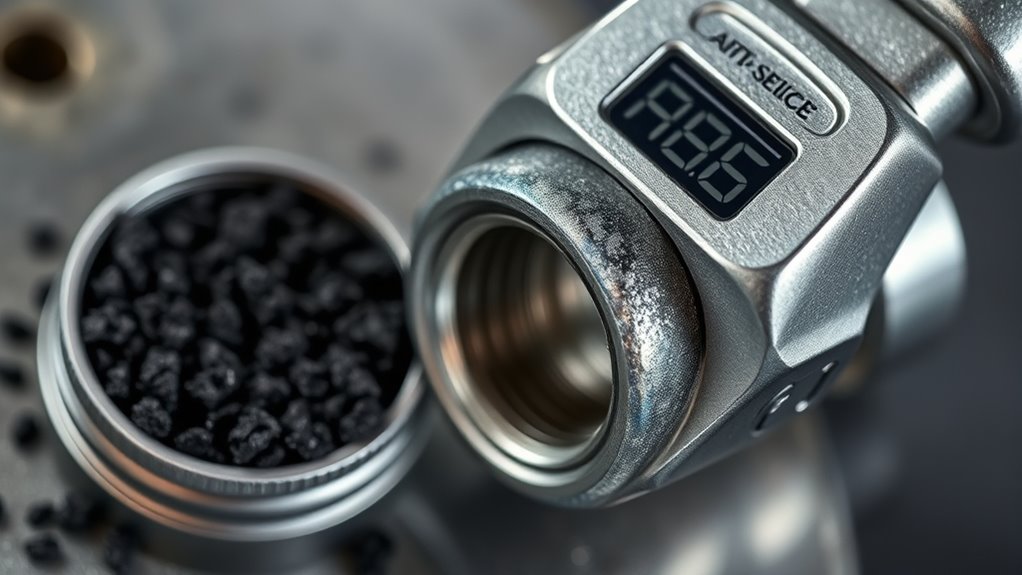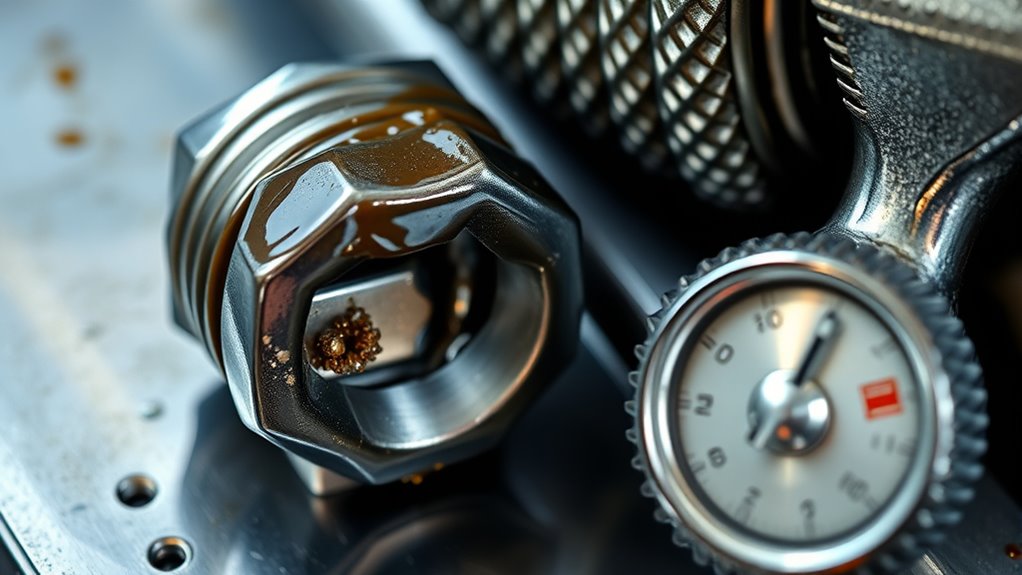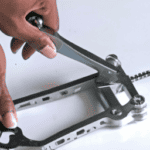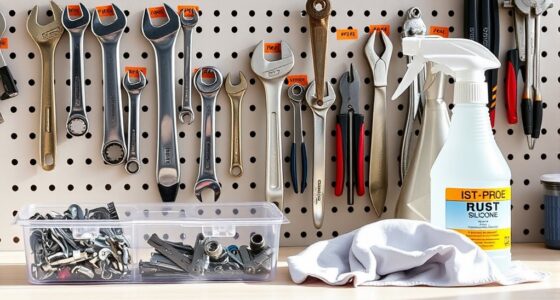To guarantee your bolts stay secure and perform well, use the right grease or anti-seize compound to reduce friction during tightening and prevent galling, especially in high-temperature or stainless steel applications. Applying the correct torque with a torque wrench helps you achieve the proper tension without over-tightening or damaging threads. Combining these practices extends the lifespan of your fasteners and enhances safety—keep exploring to discover more techniques for reliable bolted connections.
Key Takeaways
- Applying grease or anti-seize reduces friction, allowing for accurate torque application and preventing over-tightening of bolts.
- Anti-seize compounds prevent galling and seizing, especially in stainless steel or high-temperature environments.
- Proper lubrication ensures consistent tension and enhances the longevity of threaded connections.
- Using torque wrenches with lubricated bolts helps achieve specified clamping forces reliably.
- Selecting the appropriate grease or anti-seize depends on bolt material, operating temperature, and environmental conditions.

Have you ever wondered what keeps machines and structures securely fastened together? It’s a combination of factors, but one essential element is the way bolts are designed and maintained. When working with bolts, understanding the importance of thread locking and the selection of bolt materials can make all the difference in ensuring safety and durability. Thread locking involves using specific adhesives or inserts to prevent loosening caused by vibration or dynamic loads. This process is critical in applications where loose bolts could lead to failure or accidents. By incorporating thread locking methods, you can enhance the integrity of the fastening without relying solely on torque, which might loosen over time. It’s also important to think about the bolt materials, as they determine how well a bolt resists corrosion, fatigue, and wear. Steel is the most common, offering strength and affordability, but depending on your environment, you might opt for stainless steel for corrosion resistance or alloy steels for higher strength.
The choice of bolt material directly impacts how you approach grease, anti-seize, and torque. For example, applying grease or anti-seize compounds helps reduce friction during tightening, allowing you to achieve the proper torque value more accurately. This prevents over-tightening, which can damage the bolt or the threaded hole, and under-tightening, which risks loosening over time. When selecting a lubricant, ensure it’s compatible with your bolt material and the operating conditions. Anti-seize compounds are especially useful when working with stainless steel bolts or in high-temperature environments, as they prevent galling and seizing. Proper torque is essential to make sure the bolt maintains clamping force without risking damage. Using a torque wrench helps you achieve the precise tension needed for a secure fit, especially when combined with the right lubricants. Additionally, understanding how thread locking techniques interact with bolt materials can significantly improve the longevity of your fastening.
In essence, your success in securing bolts depends on understanding how thread locking methods work alongside the properties of bolt materials. By choosing the appropriate bolt material, applying the right amount of grease or anti-seize, and tightening to the correct torque, you ensure that your assemblies stay tight and reliable over time. Remember, neglecting these details can lead to loosening, equipment failure, or even safety hazards. So, whether you’re assembling machinery or fixing structural components, paying attention to these factors guarantees a more durable and safe connection. With the right knowledge and tools, you can confidently fasten components that withstand the demands of your application.
Frequently Asked Questions
How Often Should Bolt Lubricant Be Reapplied?
You should reapply bolt lubricant whenever you notice it has worn off or if you’re working in harsh conditions, as lubricant longevity varies. Regular reapplication helps prevent corrosion and guarantees ideal torque. In environments with moisture or salt, reapply more frequently. Always follow manufacturer recommendations for specific lubricants, and check the bolts periodically to maintain proper lubrication, which keeps your bolts secure and corrosion-free over time.
Can Anti-Seize Cause Over-Tightening?
Like Pandora’s box, anti-seize can cause over-tightening if not used carefully. While it helps with corrosion prevention and makes assembly easier, excessive application reduces friction, leading you to tighten bolts more than necessary. This risks damaging threads or compromising safety. Always follow manufacturer guidelines, apply the right amount, and use a torque wrench to guarantee proper tension without over-tightening, safeguarding your project’s integrity.
Are There Temperature Limits for Grease Use on Bolts?
Yes, there are temperature limits for grease use on bolts. Exceeding these limits can cause lubricant breakdown, reducing its effectiveness. At high temperatures, grease may liquefy or burn off, leading to inadequate lubrication and potential corrosion. Conversely, low temperatures can thicken the grease, making it harder to apply and compromising bolt torque. Always check the manufacturer’s specifications to guarantee your chosen grease suits the operational temperature range.
What Are the Signs of Improper Torque Application?
You’ll notice improper torque application through signs like thread deformation, which weakens the bolt’s integrity, or lubrication contamination, causing uneven tightening. Over-tightening can strip threads or break bolts, while under-tightening might lead to loose connections. Always verify proper torque specifications are followed and check for signs of damage or contamination. Regularly inspecting bolts helps prevent failures caused by incorrect torque, keeping your assembly safe and reliable.
How Do Different Bolt Materials Affect Lubrication Choices?
Your choice of lubrication depends on the bolt material to guarantee proper lubrication compatibility. For example, steel bolts often work well with standard greases, while stainless steel or aluminum bolts may require specialized anti‑seize to prevent galling or corrosion. Always match the lubricant to the bolt material, considering factors like temperature and load. Using incompatible lubricants can lead to improper torque application, loosening, or damage, so choose wisely for peak performance.
Conclusion
Remember, using the right grease or anti-seize can extend your bolt’s lifespan by up to 50%, preventing seizing and corrosion. Always torque bolts to the manufacturer’s specifications to make certain of safety and durability. Did you know that improper torque is responsible for nearly 70% of bolt failures? By paying attention to proper lubrication and torque, you can avoid costly repairs and keep your projects running smoothly. Stay diligent, and your bolts will serve you well for years to come.
















